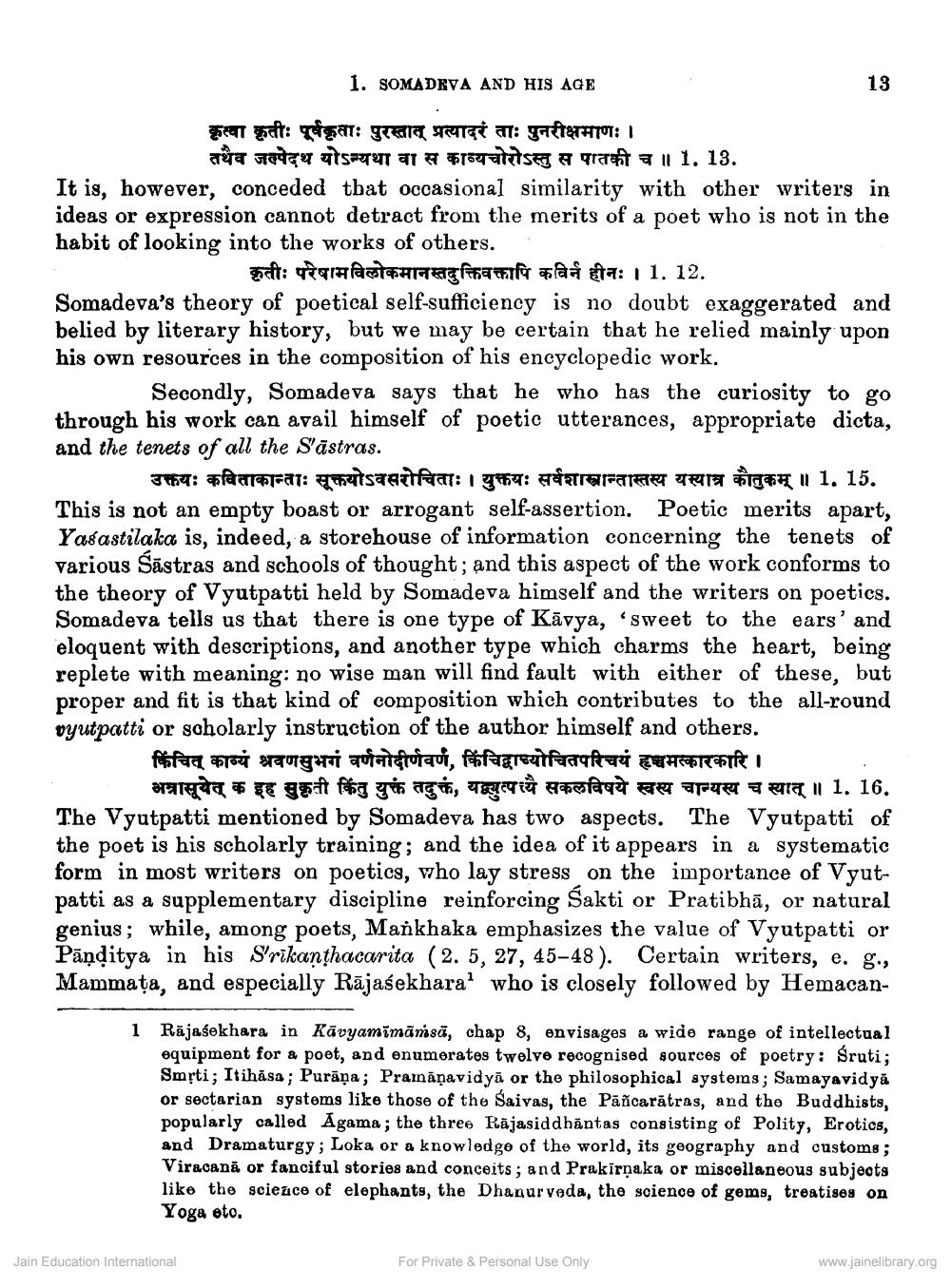________________
1. SOMADEVA AND HIS AGE
कृत्वा कृतीः पूर्वकृताः पुरस्तात् प्रत्यादरं ताः पुनरीक्षमाणः ।
तथैव जवपेदथ योऽन्यथा वा स काव्यचोरोऽस्तु स पातकी च ॥ 1. 13.
It is, however, conceded that occasional similarity with other writers in ideas or expression cannot detract from the merits of a poet who is not in the habit of looking into the works of others.
13
कृतीः परेषामविलोकमानस्तदुक्तिवक्तापि कविर्न हीनः । 1. 12. Somadeva's theory of poetical self-sufficiency is no doubt exaggerated and belied by literary history, but we may be certain that he relied mainly upon his own resources in the composition of his encyclopedic work.
Secondly, Somadeva says that he who has the curiosity to go through his work can avail himself of poetic utterances, appropriate dicta, and the tenets of all the S'astras.
उक्तयः कविताकान्ताः सूक्तयोऽवसरोचिताः । युक्तयः सर्वशास्त्रान्तास्तस्य यस्यात्र कौतुकम् ॥ 1. 15. This is not an empty boast or arrogant self-assertion. Poetic merits apart, Yasastilaka is, indeed, a storehouse of information concerning the tenets of various Sastras and schools of thought; and this aspect of the work conforms to the theory of Vyutpatti held by Somadeva himself and the writers on poetics. Somadeva tells us that there is one type of Kavya, 'sweet to the ears' and eloquent with descriptions, and another type which charms the heart, being replete with meaning: no wise man will find fault with either of these, but proper and fit is that kind of composition which contributes to the all-round vyutpatti or scholarly instruction of the author himself and others.
किंचित् काव्यं श्रवणसुभगं वर्णनोदीर्णवर्ण, किंचिद्वाच्योचितपरिचयं हृचमत्कारकारि ।
अनसूयेत् क इह सुकृती किंतु युक्तं तदुक्तं, यद्व्युत्पत्यै सकलविषये स्वस्य चान्यस्य च स्यात् ॥ 1. 16. The Vyutpatti mentioned by Somadeva has two aspects. The Vyutpatti of the poet is his scholarly training; and the idea of it appears in a systematic form in most writers on poetics, who lay stress on the importance of Vyutpatti as a supplementary discipline reinforcing Sakti or Pratibha, or natural genius; while, among poets, Mankhaka emphasizes the value of Vyutpatti or Panditya in his Srikanthacarita (2. 5, 27, 45-48). Certain writers, e. g., Mammata, and especially Rajasekhara' who is closely followed by Hemacan
Jain Education International
1 Rajasekhara in Kāvyamīmāmsā, chap 8, envisages a wide range of intellectual equipment for a poet, and enumerates twelve recognised sources of poetry: Śruti; Smrti; Itihasa; Purana; Pramaṇavidya or the philosophical systems; Samayavidya or sectarian systems like those of the Saivas, the Pañcaratras, and the Buddhists, popularly called Agama; the three Rajasiddhantas consisting of Polity, Erotics, and Dramaturgy; Loka or a knowledge of the world, its geography and customs; Viracanã or fanciful stories and conceits; and Prakirņaka or miscellaneous subjects like the science of elephants, the Dhanurveda, the science of gems, treatises on Yoga etc.
For Private & Personal Use Only
www.jainelibrary.org




